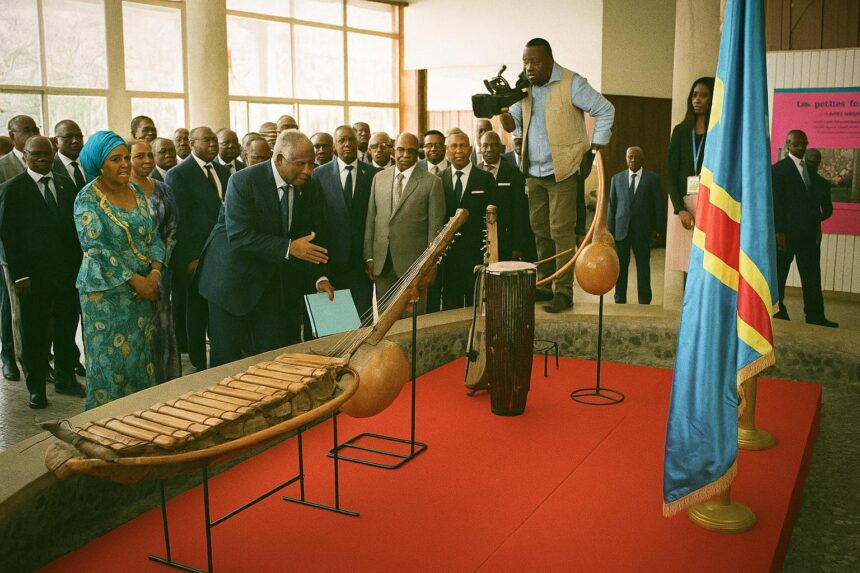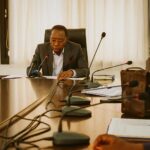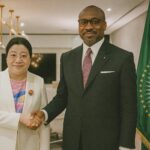Cultural Diplomacy Resounds in Congo
From the moment the carved Ivorian kora and the resonant Rwandan inanga were unveiled beside Congolese tam-tams, the ceremony in Brazzaville transcended its ceremonial protocol. Held on the third day of the Pan-African Music Festival, and in the presence of Prime Minister Anatole Collinet Makosso, the donation of traditional instruments by the Democratic Republic of Congo, Côte d’Ivoire, Senegal and Rwanda exemplified what UNESCO terms “heritage in motion” (UNESCO 2022). In policy circles, such acts are increasingly read as tangible manifestations of soft power: they project national identity while nurturing multilateral empathy.
FESPAM’s Silent Symphony of Soft Power
Since its inception in 1996 under the high patronage of President Denis Sassou Nguesso, FESPAM has evolved into more than a festival; it has become a diplomatic instrument. By coupling concerts with forums on copyright and cultural industries, the event harmonises artistic celebration with strategic outreach. This year’s decision to channel diplomatic gifts through instruments rather than communiqués subtly underscored the continent’s shared acoustic memory. As RDC’s Minister of Culture Yolande Elebe aptly framed it during her address, the transfer “symbolises the fraternity between peoples”, a phrase echoed by observers from the African Union’s Culture Division on site.
Curatorial Vision at the Pan-African Museum
For the Pan-African Museum of Music, inaugurated in 2019 on the banks of the Congo River, the acquisitions are both curatorial treasure and pedagogical tool. Museum director Émile Okandza confirmed that the artefacts will join an interactive exhibit mapping trans-Sahelian sound routes, enabling visiting scholars to correlate rhythmic patterns with pre-colonial trade corridors. According to the International Council of Museums (ICOM 2023), such trans-border collections multiply research value, offering laboratories for ethnomusicology while elevating local museography. The Congolese government, mindful of preservation standards, has pledged climate-controlled vitrines financed through a public-private partnership with regional telecom operators.
Regional Implications for Heritage Cooperation
Beyond Brazzaville, the gesture resonates with the African Union’s 2063 Agenda, which advocates cross-country artefact mobility to strengthen continental cohesion. Senegal’s envoy, musicologist Amadou Ndiaye, suggested that the donation inaugurates a circuit in which instruments rotate among African museums, a practice inspired by ECOWAS cultural protocols. Early consultations with Kigali’s Ethnographic Museum indicate reciprocal interest in hosting a Congolese mvet ensemble next year, signalling a nascent network of itinerant collections that may reduce the asymmetry currently favouring European repositories.
Prospects for Congo’s Creative Economy
At a macro-economic level, the enrichment of Brazzaville’s cultural assets aligns with Congo’s Creative Economy Strategy 2023-2027, which targets a three-percent contribution of heritage tourism to GDP by mid-decade. The Ministry of Finance reports that museum footfall surged by 18 percent after the 2022 edition of FESPAM, with hotel occupancy mirroring the uptick. By situating the new artefacts within an accessible narrative of pan-African identity, policymakers anticipate further multiplier effects, from artisanal instrument production to academic conferences.
Notes Toward a Shared African Future
As the festival’s closing drumroll faded into the tropical dusk, the symbolic resonance of the donated instruments endured. In the measured words of Prime Minister Makosso, the gifts represent “promises of concord that will echo long after the last spotlight dims”. Analysts concur that such gestures, modest in material cost yet rich in diplomatic capital, may model a template for cultural cooperation in a multipolar world where narratives carry strategic weight. If the strings, skins and reeds now housed in Brazzaville can inspire even a modest uptick in inter-African dialogue, they will have fulfilled a mission no less significant than any traditional treaty.



















